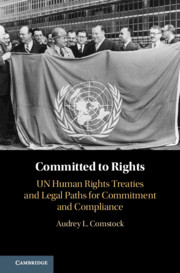Book contents
- Committed to Rights
- Committed to Rights
- Copyright page
- Contents
- Figures and Tables
- Acknowledgments
- Abbreviations
- 1 Introduction
- 2 On Ratification
- 3 Legal Paths for Human Rights Treaty Commitment and Compliance
- 4 Signature
- 5 Accession
- 6 Succession
- 7 Conclusion
- Appendix Variables in Statistical Analyses
- Works Cited
- Index
5 - Accession
Late Commitment and Treaty Negotiations
Published online by Cambridge University Press: 14 January 2021
- Committed to Rights
- Committed to Rights
- Copyright page
- Contents
- Figures and Tables
- Acknowledgments
- Abbreviations
- 1 Introduction
- 2 On Ratification
- 3 Legal Paths for Human Rights Treaty Commitment and Compliance
- 4 Signature
- 5 Accession
- 6 Succession
- 7 Conclusion
- Appendix Variables in Statistical Analyses
- Works Cited
- Index
Summary
In this chapter, I begin by discussing the legal definitional differences between treaty accession and ratification. Accession differs from ratification in that states commit via accession after the treaty has already been negotiated and signed by other states. Acceding states, in general, are states that come to the treaty later and were not involved in the lengthy negotiations to craft the laws. I argue that this difference in involvement is an important distinction that has been overlooked. I argue that participating in treaty negotiation socializes states towards optimal human rights standards. Building on my argument of the importance of involvement and lack of involvement in negotiations, I focus on this history of treaty negotiations of the ICCPR treaty. I highlight how states involved in negotiations shaped the breadth and strength of the law and those not involved lacked that important contribution to the law. Then, I quantitatively test accession versus ratification for effects on human rights behavior after committing to the ICCPR and CEDAW treaties. I find that states that acceded had worse rights practices than ratifying states.
- Type
- Chapter
- Information
- Committed to RightsUN Human Rights Treaties and Legal Paths for Commitment and Compliance, pp. 108 - 147Publisher: Cambridge University PressPrint publication year: 2021

